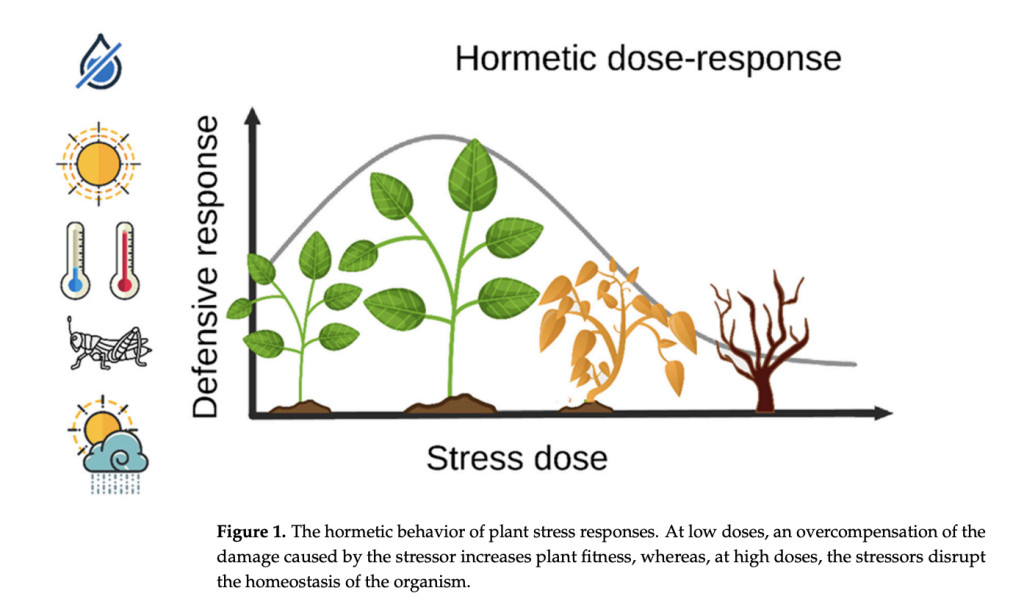Hormesis Management in Agriculture: Leveraging AI for Crop Improvement:
Plant stress negatively impacts crop productivity but can also be beneficial when controlled, a phenomenon known as hormesis. Hormesis management involves exposing crops to low doses of stressors to enhance traits like stress tolerance and metabolite production. However, the complexity of plant responses to stress limits this approach. Recent advancements in AI, particularly ML and DL, are crucial for analyzing complex datasets and accurately modeling plant stress responses. These AI tools can significantly improve the development of hormesis management protocols, enhancing crop yield and quality.
The Revival of Hormesis in Plant Stress Science:
The concept of hormesis, which describes the biphasic dose response to external stimuli, has been increasingly recognized in scientific research. Initially described in the late 19th century and named in 1943, hormesis was largely dismissed until recent decades due to its mistaken association with homeopathy. Now, its relevance is acknowledged across various fields, including sustainable agriculture. Controlled exposure to low doses of stressors in plants can enhance defensive mechanisms and productivity. However, the complexity and specificity of plant stress responses, influenced by species, stressor type, and tissue, necessitate advanced analysis methods.
Data Integration in Plant Hormesis Research:
Plant hormesis research emphasizes the complex interplay of plant immune responses, which function as intricate networks rather than isolated pathways. Advanced high-throughput techniques, particularly multi-omics approaches, enable the comprehensive analysis of genomics, transcriptomics, proteomics, and metabolomics. These methods allow researchers to identify key molecular changes and plant stress responses, enhancing crop breeding and stress management strategies. However, the vast amount of data generated presents challenges in data management and interpretation, necessitating sophisticated computational tools to transform this information into actionable insights for improving crop resilience and productivity.
Role of AI in Plant Stress Analysis and Hormesis Management:
The vast datasets generated from high-throughput analyses in plant stress research often need more immediate biological relevance, necessitating advanced tools to extract meaningful insights. AI, particularly ML and DL, offers a powerful solution by identifying, classifying, quantifying, and predicting plant stress responses. These AI tools excel in analyzing complex, non-linear biological processes, making them invaluable for understanding and modeling plant reactions to various stressors. Recent studies have applied AI techniques to different aspects of plant stress, from image-based phenotyping to genomic and transcriptomic data analysis, highlighting AI’s potential to predict stress-induced phenotypic traits before they manifest.
In addition to traditional applications, AI, especially DL, is proving crucial in managing hormesis—a beneficial response to low-dose stress—by optimizing crop performance. CNNs have been widely used to evaluate plant traits, model crop responses, and enhance stress tolerance. The growing accessibility of powerful cloud computing platforms and open-source software like TensorFlow and PyTorch has democratized the use of DL in plant science, enabling researchers to leverage sophisticated AI models without the need for costly local infrastructure. These advancements drive significant progress in plant stress science, offering new ways to improve crop yield and resilience.
Challenges and Future Directions in AI for Plant Stress Modeling:
While AI, particularly ML, offers significant potential for analyzing plant stress responses, several challenges persist. Selecting the right ML architecture is complex due to the various available platforms and their varying performances. Additionally, ML methods often function as “black boxes,†lacking transparency in their predictions, and they require extensive, curated datasets currently scarce in plant hormesis research. To advance AI applications in this field, there is a need for standardized research methods, better data availability, and dedicated efforts to model and optimize stress responses in plants.
Conclusion: Advancing Plant Stress Research through AI:
The goal of understanding plant stress responses is to develop cost-effective strategies for enhancing crop traits. However, standardizing experimental conditions and integrating diverse datasets remains a challenge. While most research emphasizes the negative impacts of stress, understanding hormesis—where low-stress doses stimulate beneficial traits—offers potential. Artificial intelligence, particularly ML and DL, can be instrumental in modeling these complex responses. Researchers can better predict and optimize stress management strategies by leveraging AI, ultimately improving crop productivity and quality.
s that continually change.
Check out the Paper. All credit for this research goes to the researchers of this project. Also, don’t forget to follow us on Twitter and join our Telegram Channel and LinkedIn Group. If you like our work, you will love our newsletter..
Don’t Forget to join our 48k+ ML SubReddit
Find Upcoming AI Webinars here
The post Harnessing AI for Hormesis Management and Plant Stress Analysis: Advancing Agricultural Resilience and Productivity appeared first on MarkTechPost.
Source: Read MoreÂ

